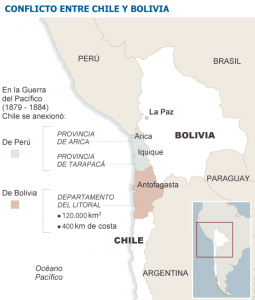By Mridula Tirumalasetti
Impunity Watch Reporter, South America
SANTIAGO, Chile—Chile wants to deny Bolivia access to the Pacific Ocean. Chilean President Michelle Bachelet stated on Monday that the country plans to challenge the jurisdiction that the International Court of Justice (ICJ) in Hague has in the matter. Bachelet stated, “Our national interest is at stake and we will defend it with all the strength, determination, and sobriety that is necessary.”
The territorial dispute between Bolivia and Chile is longstanding and historical. Bolivia filed a lawsuit against Chile in April 2013, in which the country attempted to regain access to the sea. On April 15, 2014, the Bolivian government filed a written statement which gave Chile three months to file an objection to the ICJ jurisdiction in this case.

Bolivia has asked the ICJ to grant it territory that it lost in the War of the Pacific (1879-1883), even though it signed the Treaty of Peace and Friendship with Chile in 1904. The treaty established the two countries’ current borders, but Bolivia argues it was coerced into accepting the agreement. The Bolivian government estimates approximately 400 kilometers of coastline and 129,000 square kilometers of land were lost due to the War of the Pacific. Chile and Bolivia have had tense relations ever since.
However, the Chilean government insists the two countries signed the Treaty of Peace and Friendship, and thus there is nothing more to settle.
In her address on Monday, Bachelet also stated the treaty had “been respected and implemented by both States for over a century, and Chile has granted Bolivia the widest possible right of commercial transit across its territory and ports on the Pacific.” She continued that Chile’s foreign policy was guided by “the unyielding defense of our territorial integrity and our national interests, which coincide with essential principles of international law and relations among states, including the inviolability of treaties and the stability of borders.”
Because Bolivia is a landlocked country, gaining access to ocean ports could help boost their economy. Moreover, it could help end the dispute with Chile and boost economic ties between the two States.
Bachelet’s decision received widespread support in Chile, and the dispute between the two nations has sparked nationalist sentiments. Julio Carrion, who a a political scientist specializing in the Andean region at the University of Delaware argues, “The strong anti-Chilean sentiment in Bolivia makes it risky for any government to formally give up. The best one can hope for is a gradual, silent fading away of the issue, which is unlikely to happen with the current administration.”
For more information, please see:
PanAm Post– Bachelet Rejects The Hague’s Authority in Bolivia’s Sea-Access Case–8 July 2014
El Pais–Chile to contest UN court’s jurisdiction in dispute with Bolivia over sea access–8 July 2014
The Wall Street Journal–Bolivia’s Tack Toward Pacific Faces Chilean Headwind— 8 July 2014
The Santiago Times–Bachelet: Chile will challenge ICJ jurisdiction on Bolivia case–8 July 2014